Analysis of Director's Duties under British Columbia Business Law
VerifiedAdded on 2022/11/17
|10
|1965
|324
Report
AI Summary
This report provides a comprehensive overview of the legal duties of directors and officers in British Columbia, as outlined in the Business Corporation Act. It examines the responsibilities of directors, including the duty of care, duty of loyalty, and duty to manage, while also exploring the objective and subjective tests used to assess their actions. The report analyzes key legal cases, such as Peoples v. Wise, to illustrate the application of these principles. It also discusses potential changes to existing laws, such as the implementation of transparency registers and the removal of restrictions on insider trading. The report concludes with recommendations for clarifying the obligations of directors, emphasizing the importance of acting in the best interests of the corporation and the need for transparency.
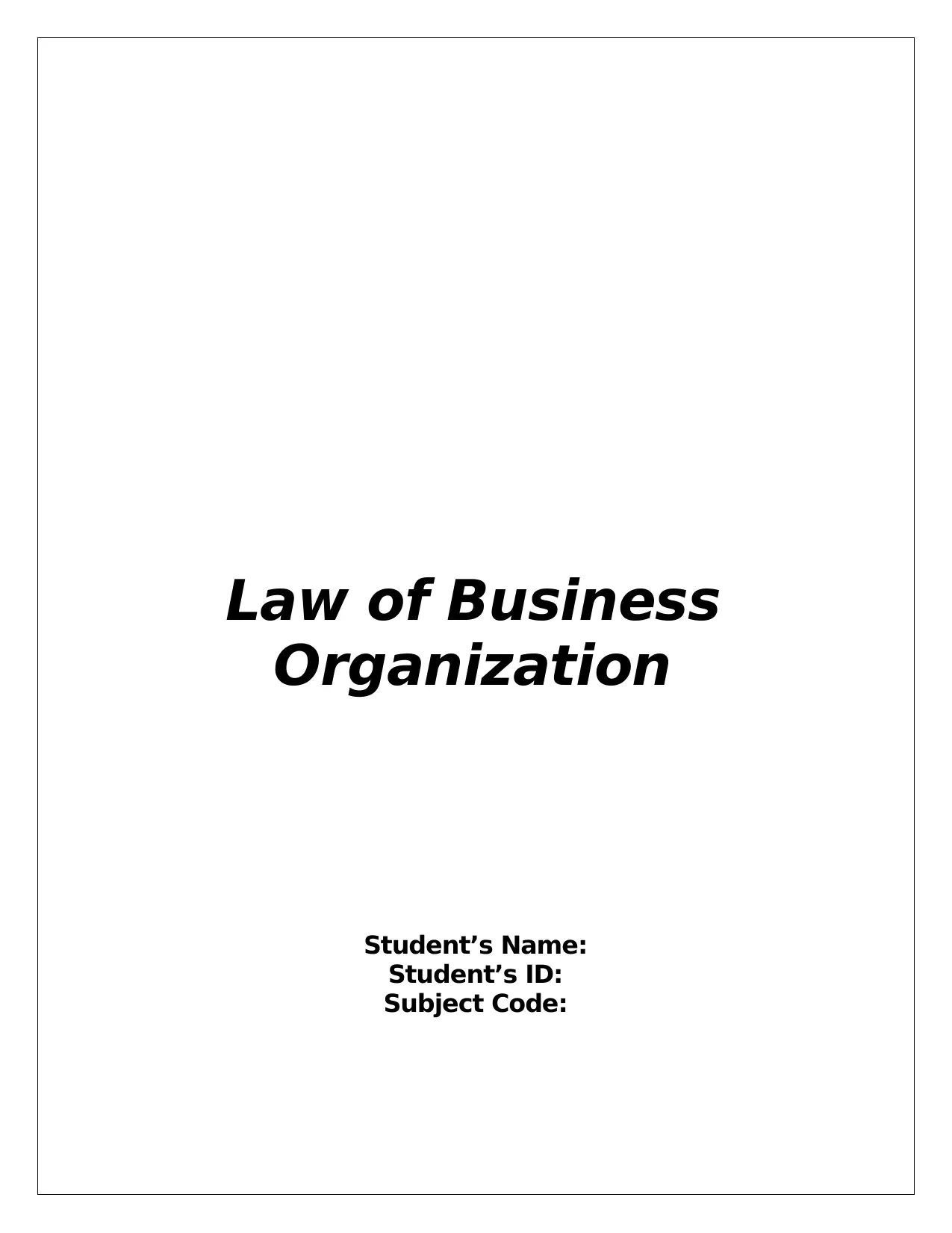
Law of Business
Organization
Student’s Name:
Student’s ID:
Subject Code:
Organization
Student’s Name:
Student’s ID:
Subject Code:
Paraphrase This Document
Need a fresh take? Get an instant paraphrase of this document with our AI Paraphraser
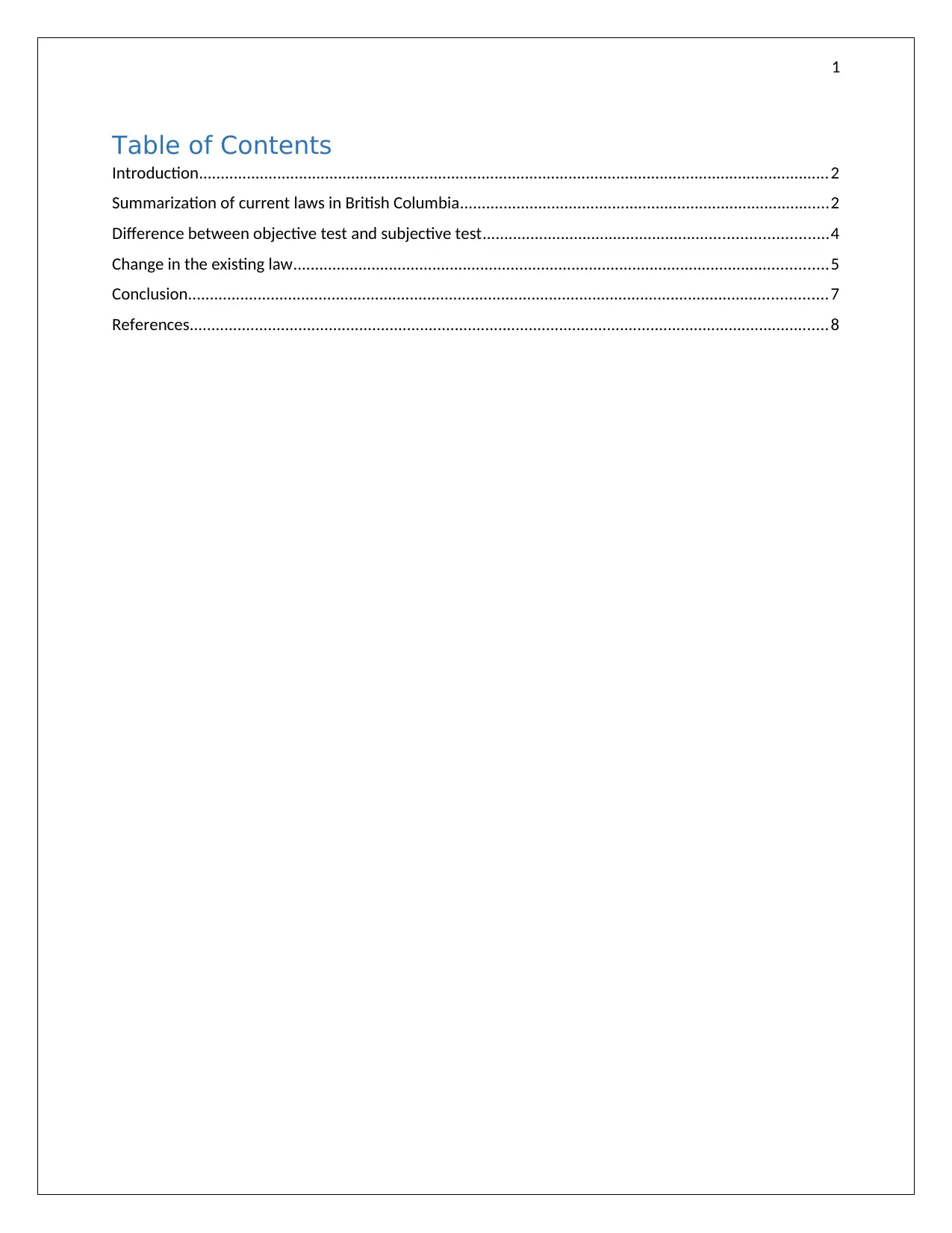
1
Table of Contents
Introduction.................................................................................................................................................2
Summarization of current laws in British Columbia.....................................................................................2
Difference between objective test and subjective test...............................................................................4
Change in the existing law...........................................................................................................................5
Conclusion...................................................................................................................................................7
References...................................................................................................................................................8
Table of Contents
Introduction.................................................................................................................................................2
Summarization of current laws in British Columbia.....................................................................................2
Difference between objective test and subjective test...............................................................................4
Change in the existing law...........................................................................................................................5
Conclusion...................................................................................................................................................7
References...................................................................................................................................................8
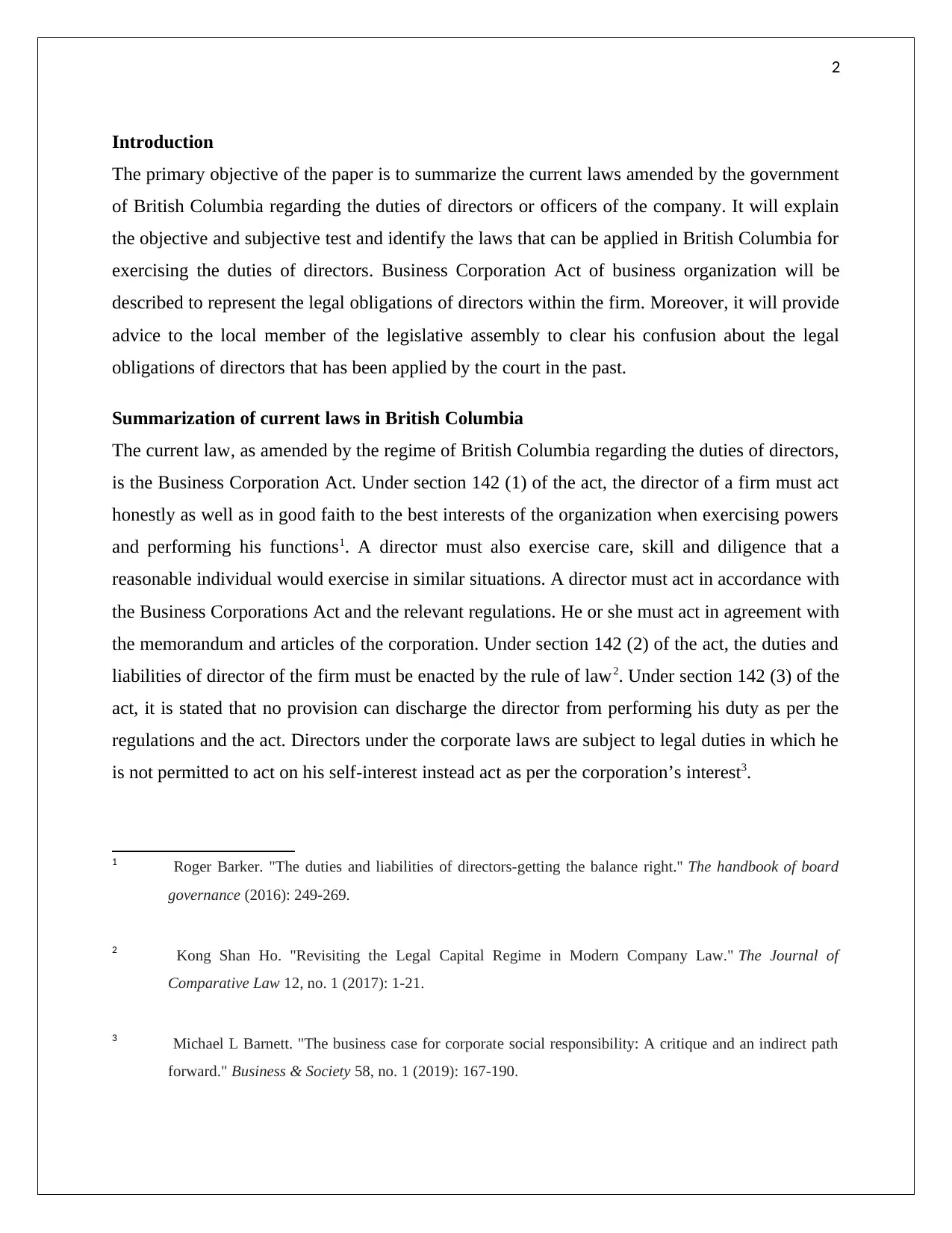
2
Introduction
The primary objective of the paper is to summarize the current laws amended by the government
of British Columbia regarding the duties of directors or officers of the company. It will explain
the objective and subjective test and identify the laws that can be applied in British Columbia for
exercising the duties of directors. Business Corporation Act of business organization will be
described to represent the legal obligations of directors within the firm. Moreover, it will provide
advice to the local member of the legislative assembly to clear his confusion about the legal
obligations of directors that has been applied by the court in the past.
Summarization of current laws in British Columbia
The current law, as amended by the regime of British Columbia regarding the duties of directors,
is the Business Corporation Act. Under section 142 (1) of the act, the director of a firm must act
honestly as well as in good faith to the best interests of the organization when exercising powers
and performing his functions1. A director must also exercise care, skill and diligence that a
reasonable individual would exercise in similar situations. A director must act in accordance with
the Business Corporations Act and the relevant regulations. He or she must act in agreement with
the memorandum and articles of the corporation. Under section 142 (2) of the act, the duties and
liabilities of director of the firm must be enacted by the rule of law2. Under section 142 (3) of the
act, it is stated that no provision can discharge the director from performing his duty as per the
regulations and the act. Directors under the corporate laws are subject to legal duties in which he
is not permitted to act on his self-interest instead act as per the corporation’s interest3.
1 Roger Barker. "The duties and liabilities of directors-getting the balance right." The handbook of board
governance (2016): 249-269.
2 Kong Shan Ho. "Revisiting the Legal Capital Regime in Modern Company Law." The Journal of
Comparative Law 12, no. 1 (2017): 1-21.
3 Michael L Barnett. "The business case for corporate social responsibility: A critique and an indirect path
forward." Business & Society 58, no. 1 (2019): 167-190.
Introduction
The primary objective of the paper is to summarize the current laws amended by the government
of British Columbia regarding the duties of directors or officers of the company. It will explain
the objective and subjective test and identify the laws that can be applied in British Columbia for
exercising the duties of directors. Business Corporation Act of business organization will be
described to represent the legal obligations of directors within the firm. Moreover, it will provide
advice to the local member of the legislative assembly to clear his confusion about the legal
obligations of directors that has been applied by the court in the past.
Summarization of current laws in British Columbia
The current law, as amended by the regime of British Columbia regarding the duties of directors,
is the Business Corporation Act. Under section 142 (1) of the act, the director of a firm must act
honestly as well as in good faith to the best interests of the organization when exercising powers
and performing his functions1. A director must also exercise care, skill and diligence that a
reasonable individual would exercise in similar situations. A director must act in accordance with
the Business Corporations Act and the relevant regulations. He or she must act in agreement with
the memorandum and articles of the corporation. Under section 142 (2) of the act, the duties and
liabilities of director of the firm must be enacted by the rule of law2. Under section 142 (3) of the
act, it is stated that no provision can discharge the director from performing his duty as per the
regulations and the act. Directors under the corporate laws are subject to legal duties in which he
is not permitted to act on his self-interest instead act as per the corporation’s interest3.
1 Roger Barker. "The duties and liabilities of directors-getting the balance right." The handbook of board
governance (2016): 249-269.
2 Kong Shan Ho. "Revisiting the Legal Capital Regime in Modern Company Law." The Journal of
Comparative Law 12, no. 1 (2017): 1-21.
3 Michael L Barnett. "The business case for corporate social responsibility: A critique and an indirect path
forward." Business & Society 58, no. 1 (2019): 167-190.
⊘ This is a preview!⊘
Do you want full access?
Subscribe today to unlock all pages.

Trusted by 1+ million students worldwide
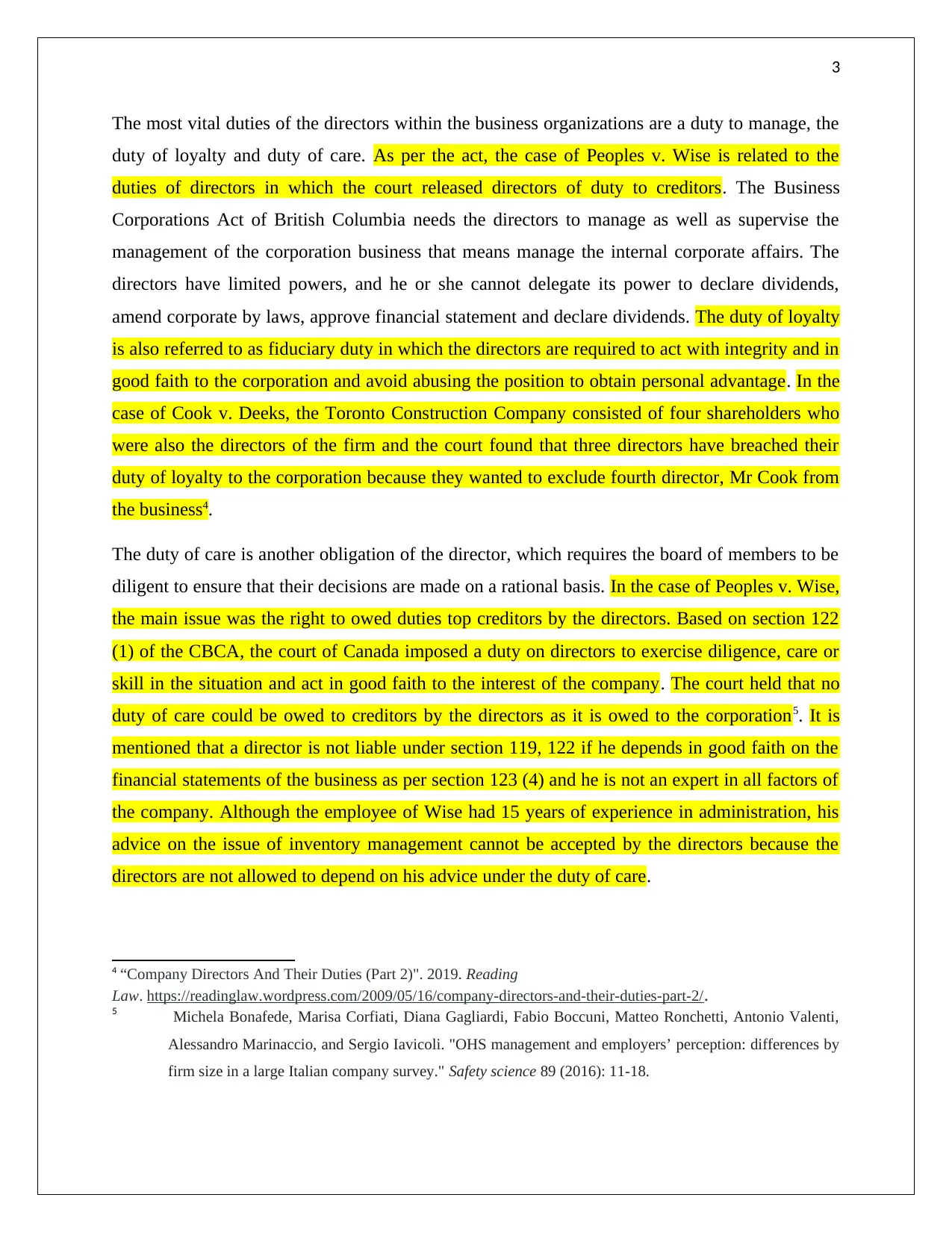
3
The most vital duties of the directors within the business organizations are a duty to manage, the
duty of loyalty and duty of care. As per the act, the case of Peoples v. Wise is related to the
duties of directors in which the court released directors of duty to creditors. The Business
Corporations Act of British Columbia needs the directors to manage as well as supervise the
management of the corporation business that means manage the internal corporate affairs. The
directors have limited powers, and he or she cannot delegate its power to declare dividends,
amend corporate by laws, approve financial statement and declare dividends. The duty of loyalty
is also referred to as fiduciary duty in which the directors are required to act with integrity and in
good faith to the corporation and avoid abusing the position to obtain personal advantage. In the
case of Cook v. Deeks, the Toronto Construction Company consisted of four shareholders who
were also the directors of the firm and the court found that three directors have breached their
duty of loyalty to the corporation because they wanted to exclude fourth director, Mr Cook from
the business4.
The duty of care is another obligation of the director, which requires the board of members to be
diligent to ensure that their decisions are made on a rational basis. In the case of Peoples v. Wise,
the main issue was the right to owed duties top creditors by the directors. Based on section 122
(1) of the CBCA, the court of Canada imposed a duty on directors to exercise diligence, care or
skill in the situation and act in good faith to the interest of the company. The court held that no
duty of care could be owed to creditors by the directors as it is owed to the corporation5. It is
mentioned that a director is not liable under section 119, 122 if he depends in good faith on the
financial statements of the business as per section 123 (4) and he is not an expert in all factors of
the company. Although the employee of Wise had 15 years of experience in administration, his
advice on the issue of inventory management cannot be accepted by the directors because the
directors are not allowed to depend on his advice under the duty of care.
4 “Company Directors And Their Duties (Part 2)". 2019. Reading
Law. https://readinglaw.wordpress.com/2009/05/16/company-directors-and-their-duties-part-2/.
5 Michela Bonafede, Marisa Corfiati, Diana Gagliardi, Fabio Boccuni, Matteo Ronchetti, Antonio Valenti,
Alessandro Marinaccio, and Sergio Iavicoli. "OHS management and employers’ perception: differences by
firm size in a large Italian company survey." Safety science 89 (2016): 11-18.
The most vital duties of the directors within the business organizations are a duty to manage, the
duty of loyalty and duty of care. As per the act, the case of Peoples v. Wise is related to the
duties of directors in which the court released directors of duty to creditors. The Business
Corporations Act of British Columbia needs the directors to manage as well as supervise the
management of the corporation business that means manage the internal corporate affairs. The
directors have limited powers, and he or she cannot delegate its power to declare dividends,
amend corporate by laws, approve financial statement and declare dividends. The duty of loyalty
is also referred to as fiduciary duty in which the directors are required to act with integrity and in
good faith to the corporation and avoid abusing the position to obtain personal advantage. In the
case of Cook v. Deeks, the Toronto Construction Company consisted of four shareholders who
were also the directors of the firm and the court found that three directors have breached their
duty of loyalty to the corporation because they wanted to exclude fourth director, Mr Cook from
the business4.
The duty of care is another obligation of the director, which requires the board of members to be
diligent to ensure that their decisions are made on a rational basis. In the case of Peoples v. Wise,
the main issue was the right to owed duties top creditors by the directors. Based on section 122
(1) of the CBCA, the court of Canada imposed a duty on directors to exercise diligence, care or
skill in the situation and act in good faith to the interest of the company. The court held that no
duty of care could be owed to creditors by the directors as it is owed to the corporation5. It is
mentioned that a director is not liable under section 119, 122 if he depends in good faith on the
financial statements of the business as per section 123 (4) and he is not an expert in all factors of
the company. Although the employee of Wise had 15 years of experience in administration, his
advice on the issue of inventory management cannot be accepted by the directors because the
directors are not allowed to depend on his advice under the duty of care.
4 “Company Directors And Their Duties (Part 2)". 2019. Reading
Law. https://readinglaw.wordpress.com/2009/05/16/company-directors-and-their-duties-part-2/.
5 Michela Bonafede, Marisa Corfiati, Diana Gagliardi, Fabio Boccuni, Matteo Ronchetti, Antonio Valenti,
Alessandro Marinaccio, and Sergio Iavicoli. "OHS management and employers’ perception: differences by
firm size in a large Italian company survey." Safety science 89 (2016): 11-18.
Paraphrase This Document
Need a fresh take? Get an instant paraphrase of this document with our AI Paraphraser
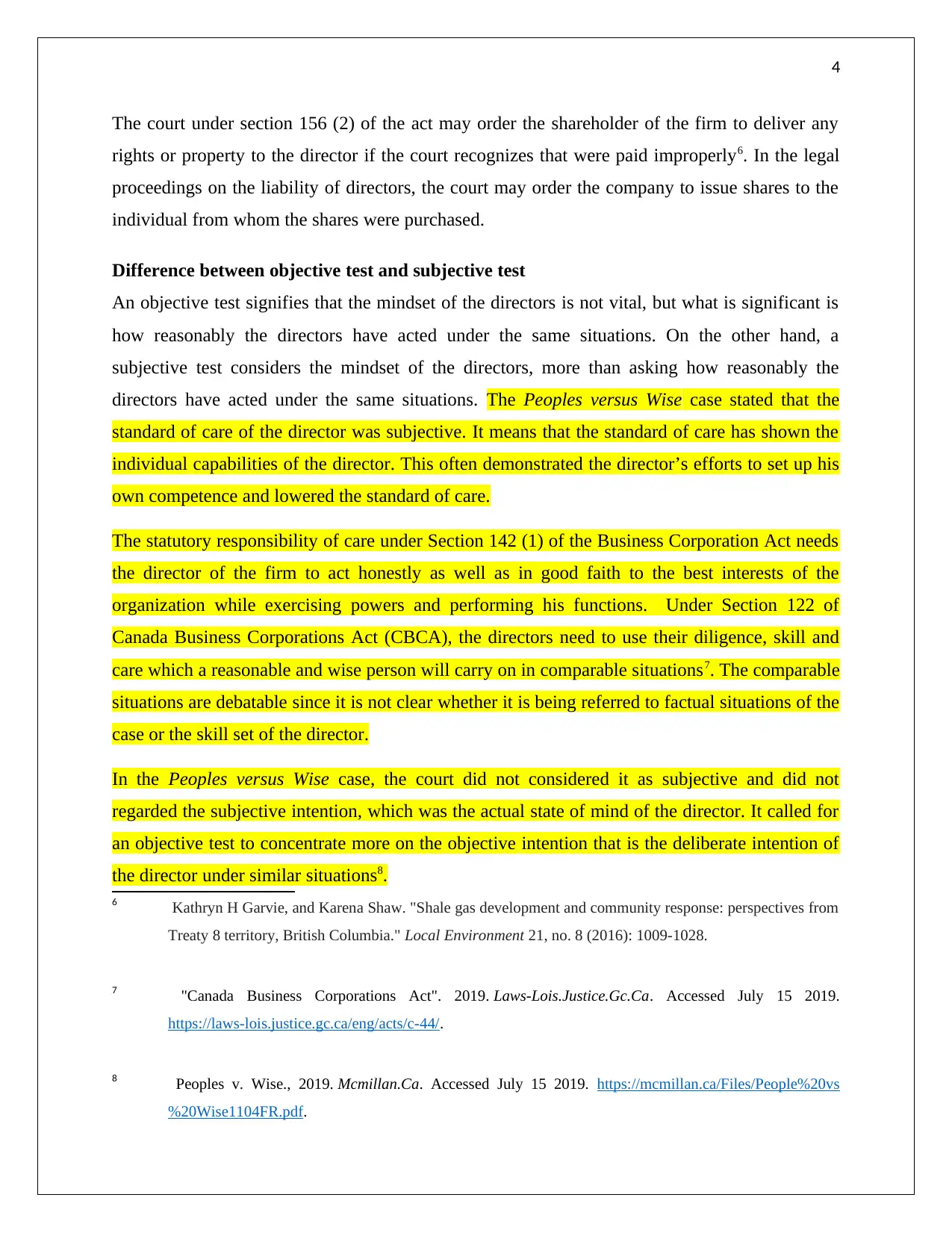
4
The court under section 156 (2) of the act may order the shareholder of the firm to deliver any
rights or property to the director if the court recognizes that were paid improperly6. In the legal
proceedings on the liability of directors, the court may order the company to issue shares to the
individual from whom the shares were purchased.
Difference between objective test and subjective test
An objective test signifies that the mindset of the directors is not vital, but what is significant is
how reasonably the directors have acted under the same situations. On the other hand, a
subjective test considers the mindset of the directors, more than asking how reasonably the
directors have acted under the same situations. The Peoples versus Wise case stated that the
standard of care of the director was subjective. It means that the standard of care has shown the
individual capabilities of the director. This often demonstrated the director’s efforts to set up his
own competence and lowered the standard of care.
The statutory responsibility of care under Section 142 (1) of the Business Corporation Act needs
the director of the firm to act honestly as well as in good faith to the best interests of the
organization while exercising powers and performing his functions. Under Section 122 of
Canada Business Corporations Act (CBCA), the directors need to use their diligence, skill and
care which a reasonable and wise person will carry on in comparable situations7. The comparable
situations are debatable since it is not clear whether it is being referred to factual situations of the
case or the skill set of the director.
In the Peoples versus Wise case, the court did not considered it as subjective and did not
regarded the subjective intention, which was the actual state of mind of the director. It called for
an objective test to concentrate more on the objective intention that is the deliberate intention of
the director under similar situations8.
6 Kathryn H Garvie, and Karena Shaw. "Shale gas development and community response: perspectives from
Treaty 8 territory, British Columbia." Local Environment 21, no. 8 (2016): 1009-1028.
7 "Canada Business Corporations Act". 2019. Laws-Lois.Justice.Gc.Ca. Accessed July 15 2019.
https://laws-lois.justice.gc.ca/eng/acts/c-44/.
8 Peoples v. Wise., 2019. Mcmillan.Ca. Accessed July 15 2019. https://mcmillan.ca/Files/People%20vs
%20Wise1104FR.pdf.
The court under section 156 (2) of the act may order the shareholder of the firm to deliver any
rights or property to the director if the court recognizes that were paid improperly6. In the legal
proceedings on the liability of directors, the court may order the company to issue shares to the
individual from whom the shares were purchased.
Difference between objective test and subjective test
An objective test signifies that the mindset of the directors is not vital, but what is significant is
how reasonably the directors have acted under the same situations. On the other hand, a
subjective test considers the mindset of the directors, more than asking how reasonably the
directors have acted under the same situations. The Peoples versus Wise case stated that the
standard of care of the director was subjective. It means that the standard of care has shown the
individual capabilities of the director. This often demonstrated the director’s efforts to set up his
own competence and lowered the standard of care.
The statutory responsibility of care under Section 142 (1) of the Business Corporation Act needs
the director of the firm to act honestly as well as in good faith to the best interests of the
organization while exercising powers and performing his functions. Under Section 122 of
Canada Business Corporations Act (CBCA), the directors need to use their diligence, skill and
care which a reasonable and wise person will carry on in comparable situations7. The comparable
situations are debatable since it is not clear whether it is being referred to factual situations of the
case or the skill set of the director.
In the Peoples versus Wise case, the court did not considered it as subjective and did not
regarded the subjective intention, which was the actual state of mind of the director. It called for
an objective test to concentrate more on the objective intention that is the deliberate intention of
the director under similar situations8.
6 Kathryn H Garvie, and Karena Shaw. "Shale gas development and community response: perspectives from
Treaty 8 territory, British Columbia." Local Environment 21, no. 8 (2016): 1009-1028.
7 "Canada Business Corporations Act". 2019. Laws-Lois.Justice.Gc.Ca. Accessed July 15 2019.
https://laws-lois.justice.gc.ca/eng/acts/c-44/.
8 Peoples v. Wise., 2019. Mcmillan.Ca. Accessed July 15 2019. https://mcmillan.ca/Files/People%20vs
%20Wise1104FR.pdf.
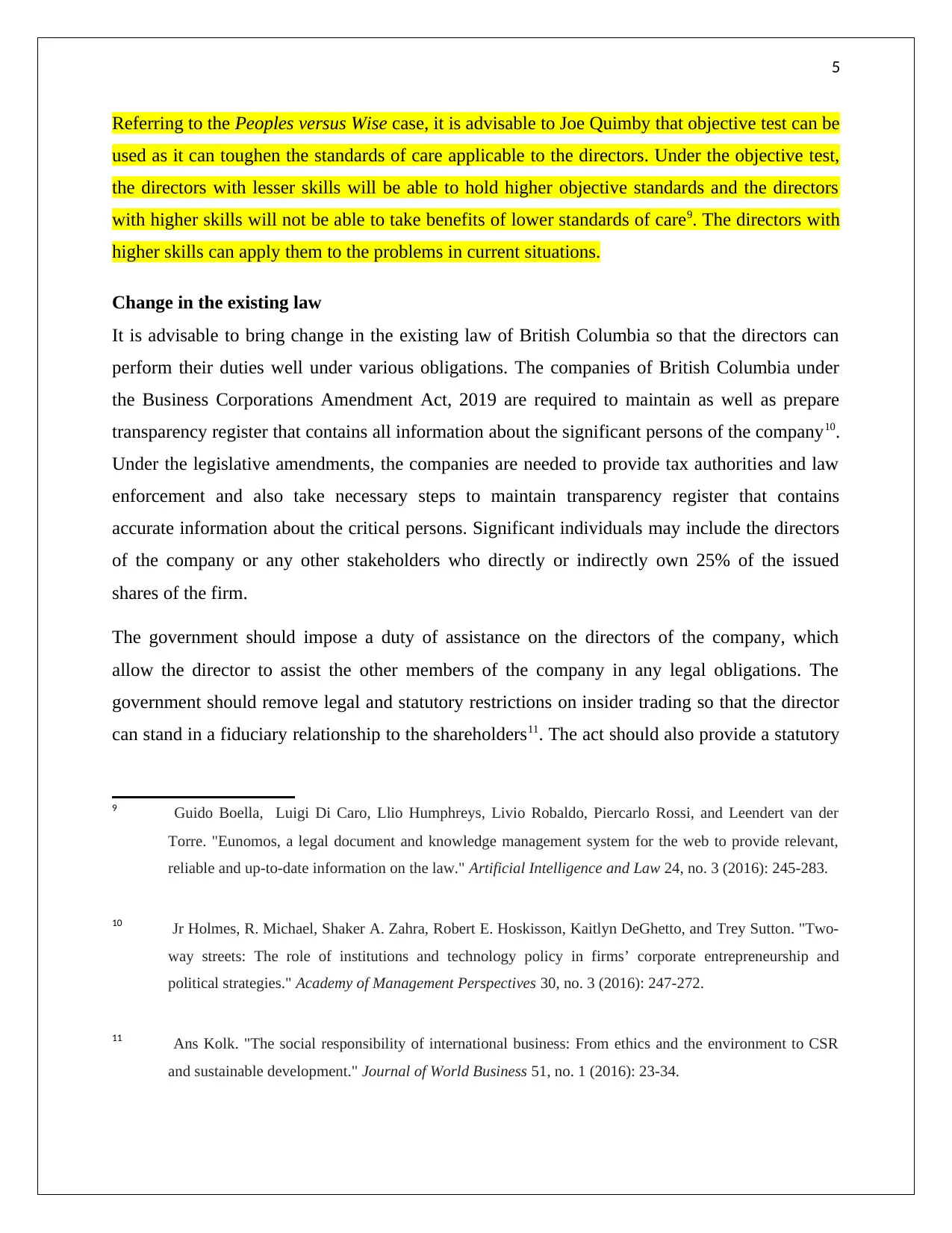
5
Referring to the Peoples versus Wise case, it is advisable to Joe Quimby that objective test can be
used as it can toughen the standards of care applicable to the directors. Under the objective test,
the directors with lesser skills will be able to hold higher objective standards and the directors
with higher skills will not be able to take benefits of lower standards of care9. The directors with
higher skills can apply them to the problems in current situations.
Change in the existing law
It is advisable to bring change in the existing law of British Columbia so that the directors can
perform their duties well under various obligations. The companies of British Columbia under
the Business Corporations Amendment Act, 2019 are required to maintain as well as prepare
transparency register that contains all information about the significant persons of the company10.
Under the legislative amendments, the companies are needed to provide tax authorities and law
enforcement and also take necessary steps to maintain transparency register that contains
accurate information about the critical persons. Significant individuals may include the directors
of the company or any other stakeholders who directly or indirectly own 25% of the issued
shares of the firm.
The government should impose a duty of assistance on the directors of the company, which
allow the director to assist the other members of the company in any legal obligations. The
government should remove legal and statutory restrictions on insider trading so that the director
can stand in a fiduciary relationship to the shareholders11. The act should also provide a statutory
9 Guido Boella, Luigi Di Caro, Llio Humphreys, Livio Robaldo, Piercarlo Rossi, and Leendert van der
Torre. "Eunomos, a legal document and knowledge management system for the web to provide relevant,
reliable and up-to-date information on the law." Artificial Intelligence and Law 24, no. 3 (2016): 245-283.
10 Jr Holmes, R. Michael, Shaker A. Zahra, Robert E. Hoskisson, Kaitlyn DeGhetto, and Trey Sutton. "Two-
way streets: The role of institutions and technology policy in firms’ corporate entrepreneurship and
political strategies." Academy of Management Perspectives 30, no. 3 (2016): 247-272.
11 Ans Kolk. "The social responsibility of international business: From ethics and the environment to CSR
and sustainable development." Journal of World Business 51, no. 1 (2016): 23-34.
Referring to the Peoples versus Wise case, it is advisable to Joe Quimby that objective test can be
used as it can toughen the standards of care applicable to the directors. Under the objective test,
the directors with lesser skills will be able to hold higher objective standards and the directors
with higher skills will not be able to take benefits of lower standards of care9. The directors with
higher skills can apply them to the problems in current situations.
Change in the existing law
It is advisable to bring change in the existing law of British Columbia so that the directors can
perform their duties well under various obligations. The companies of British Columbia under
the Business Corporations Amendment Act, 2019 are required to maintain as well as prepare
transparency register that contains all information about the significant persons of the company10.
Under the legislative amendments, the companies are needed to provide tax authorities and law
enforcement and also take necessary steps to maintain transparency register that contains
accurate information about the critical persons. Significant individuals may include the directors
of the company or any other stakeholders who directly or indirectly own 25% of the issued
shares of the firm.
The government should impose a duty of assistance on the directors of the company, which
allow the director to assist the other members of the company in any legal obligations. The
government should remove legal and statutory restrictions on insider trading so that the director
can stand in a fiduciary relationship to the shareholders11. The act should also provide a statutory
9 Guido Boella, Luigi Di Caro, Llio Humphreys, Livio Robaldo, Piercarlo Rossi, and Leendert van der
Torre. "Eunomos, a legal document and knowledge management system for the web to provide relevant,
reliable and up-to-date information on the law." Artificial Intelligence and Law 24, no. 3 (2016): 245-283.
10 Jr Holmes, R. Michael, Shaker A. Zahra, Robert E. Hoskisson, Kaitlyn DeGhetto, and Trey Sutton. "Two-
way streets: The role of institutions and technology policy in firms’ corporate entrepreneurship and
political strategies." Academy of Management Perspectives 30, no. 3 (2016): 247-272.
11 Ans Kolk. "The social responsibility of international business: From ethics and the environment to CSR
and sustainable development." Journal of World Business 51, no. 1 (2016): 23-34.
⊘ This is a preview!⊘
Do you want full access?
Subscribe today to unlock all pages.

Trusted by 1+ million students worldwide
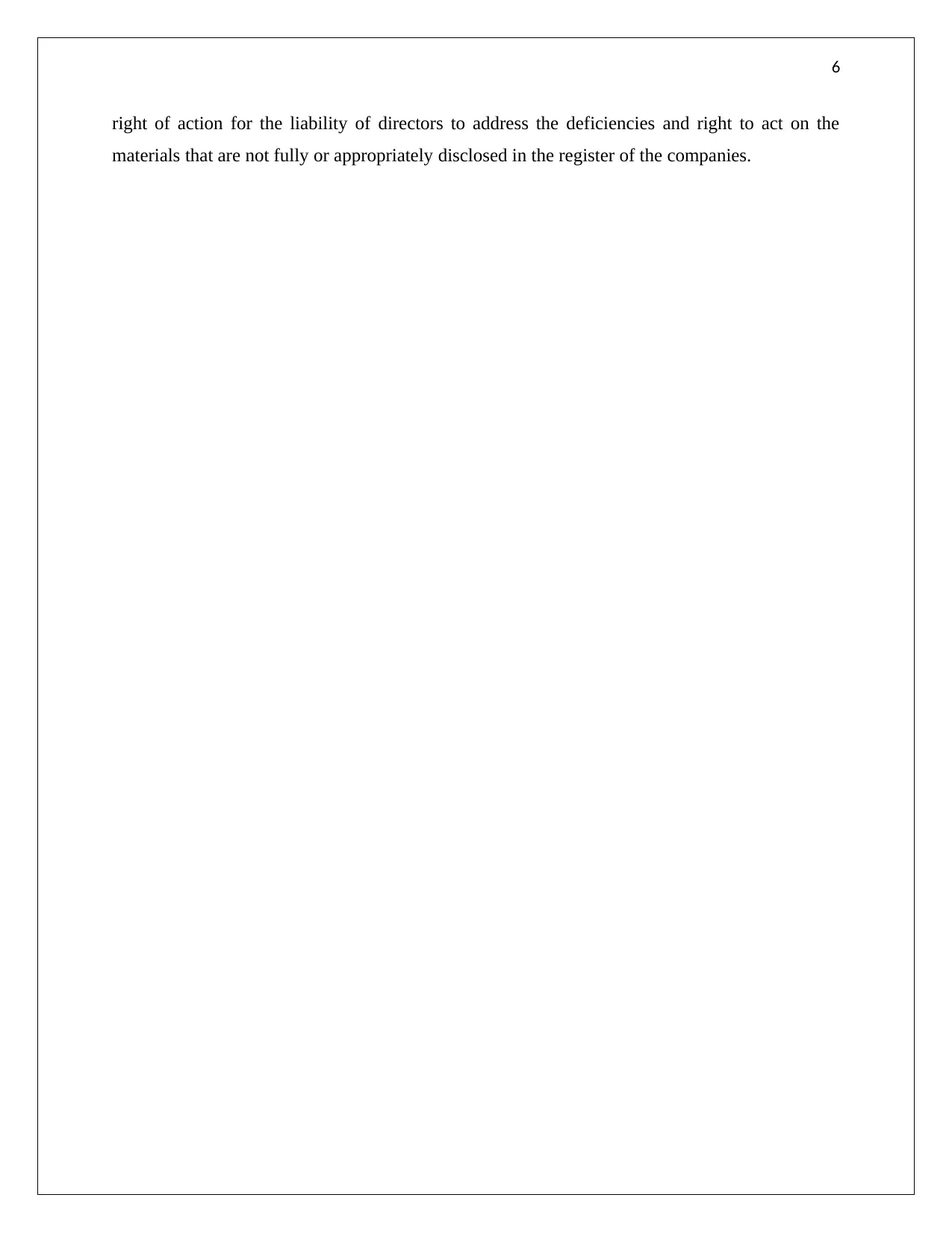
6
right of action for the liability of directors to address the deficiencies and right to act on the
materials that are not fully or appropriately disclosed in the register of the companies.
right of action for the liability of directors to address the deficiencies and right to act on the
materials that are not fully or appropriately disclosed in the register of the companies.
Paraphrase This Document
Need a fresh take? Get an instant paraphrase of this document with our AI Paraphraser
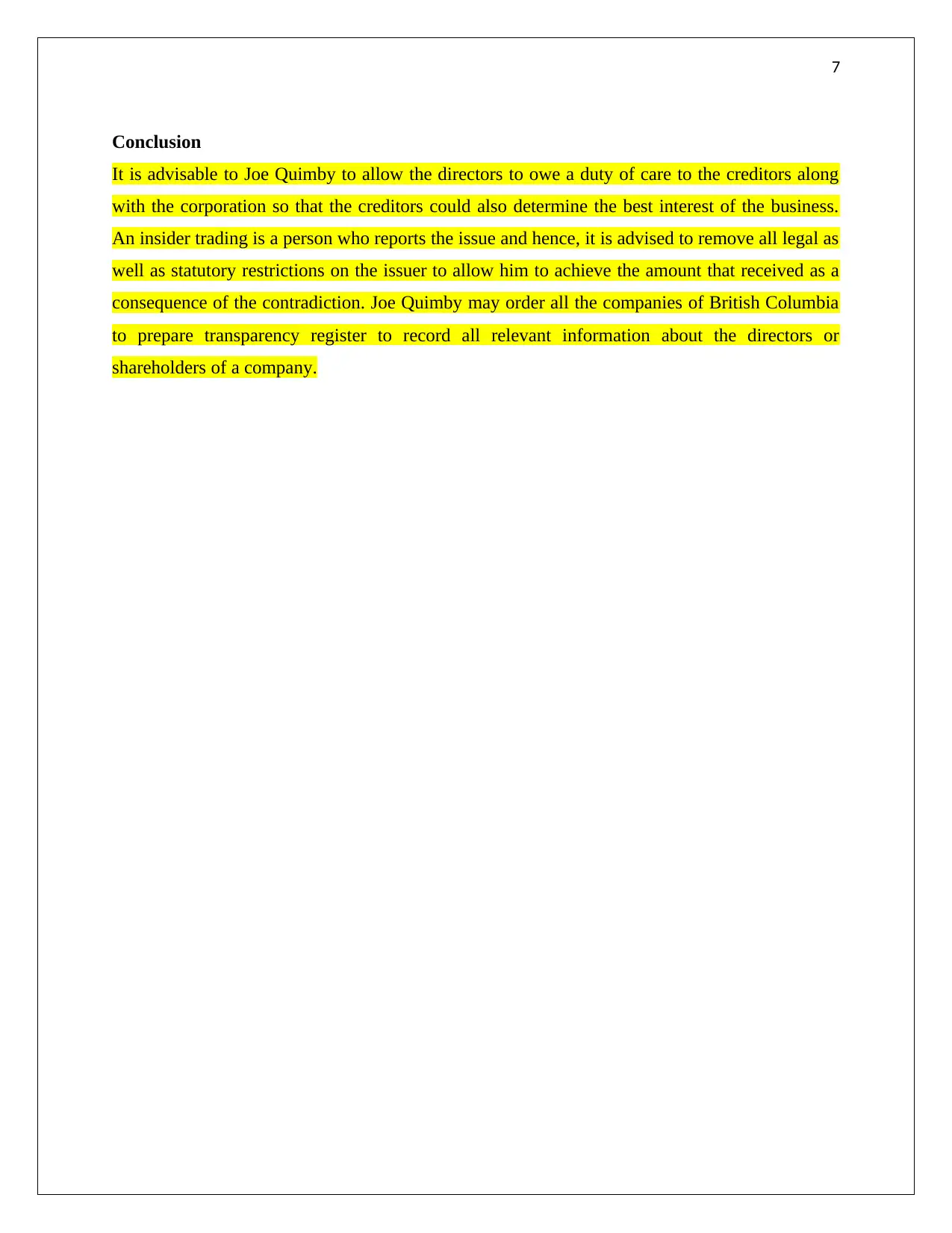
7
Conclusion
It is advisable to Joe Quimby to allow the directors to owe a duty of care to the creditors along
with the corporation so that the creditors could also determine the best interest of the business.
An insider trading is a person who reports the issue and hence, it is advised to remove all legal as
well as statutory restrictions on the issuer to allow him to achieve the amount that received as a
consequence of the contradiction. Joe Quimby may order all the companies of British Columbia
to prepare transparency register to record all relevant information about the directors or
shareholders of a company.
Conclusion
It is advisable to Joe Quimby to allow the directors to owe a duty of care to the creditors along
with the corporation so that the creditors could also determine the best interest of the business.
An insider trading is a person who reports the issue and hence, it is advised to remove all legal as
well as statutory restrictions on the issuer to allow him to achieve the amount that received as a
consequence of the contradiction. Joe Quimby may order all the companies of British Columbia
to prepare transparency register to record all relevant information about the directors or
shareholders of a company.
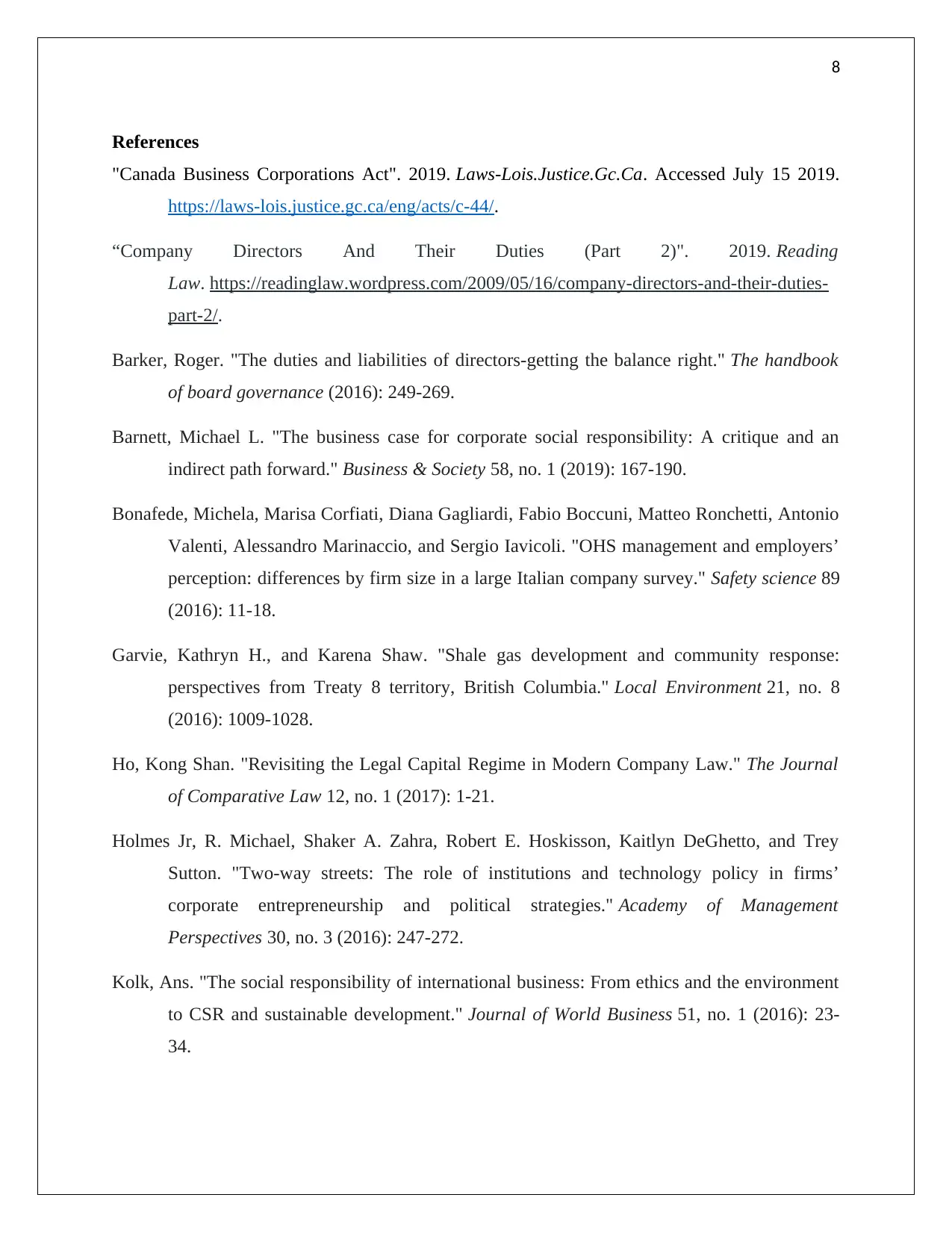
8
References
"Canada Business Corporations Act". 2019. Laws-Lois.Justice.Gc.Ca. Accessed July 15 2019.
https://laws-lois.justice.gc.ca/eng/acts/c-44/.
“Company Directors And Their Duties (Part 2)". 2019. Reading
Law. https://readinglaw.wordpress.com/2009/05/16/company-directors-and-their-duties-
part-2/.
Barker, Roger. "The duties and liabilities of directors-getting the balance right." The handbook
of board governance (2016): 249-269.
Barnett, Michael L. "The business case for corporate social responsibility: A critique and an
indirect path forward." Business & Society 58, no. 1 (2019): 167-190.
Bonafede, Michela, Marisa Corfiati, Diana Gagliardi, Fabio Boccuni, Matteo Ronchetti, Antonio
Valenti, Alessandro Marinaccio, and Sergio Iavicoli. "OHS management and employers’
perception: differences by firm size in a large Italian company survey." Safety science 89
(2016): 11-18.
Garvie, Kathryn H., and Karena Shaw. "Shale gas development and community response:
perspectives from Treaty 8 territory, British Columbia." Local Environment 21, no. 8
(2016): 1009-1028.
Ho, Kong Shan. "Revisiting the Legal Capital Regime in Modern Company Law." The Journal
of Comparative Law 12, no. 1 (2017): 1-21.
Holmes Jr, R. Michael, Shaker A. Zahra, Robert E. Hoskisson, Kaitlyn DeGhetto, and Trey
Sutton. "Two-way streets: The role of institutions and technology policy in firms’
corporate entrepreneurship and political strategies." Academy of Management
Perspectives 30, no. 3 (2016): 247-272.
Kolk, Ans. "The social responsibility of international business: From ethics and the environment
to CSR and sustainable development." Journal of World Business 51, no. 1 (2016): 23-
34.
References
"Canada Business Corporations Act". 2019. Laws-Lois.Justice.Gc.Ca. Accessed July 15 2019.
https://laws-lois.justice.gc.ca/eng/acts/c-44/.
“Company Directors And Their Duties (Part 2)". 2019. Reading
Law. https://readinglaw.wordpress.com/2009/05/16/company-directors-and-their-duties-
part-2/.
Barker, Roger. "The duties and liabilities of directors-getting the balance right." The handbook
of board governance (2016): 249-269.
Barnett, Michael L. "The business case for corporate social responsibility: A critique and an
indirect path forward." Business & Society 58, no. 1 (2019): 167-190.
Bonafede, Michela, Marisa Corfiati, Diana Gagliardi, Fabio Boccuni, Matteo Ronchetti, Antonio
Valenti, Alessandro Marinaccio, and Sergio Iavicoli. "OHS management and employers’
perception: differences by firm size in a large Italian company survey." Safety science 89
(2016): 11-18.
Garvie, Kathryn H., and Karena Shaw. "Shale gas development and community response:
perspectives from Treaty 8 territory, British Columbia." Local Environment 21, no. 8
(2016): 1009-1028.
Ho, Kong Shan. "Revisiting the Legal Capital Regime in Modern Company Law." The Journal
of Comparative Law 12, no. 1 (2017): 1-21.
Holmes Jr, R. Michael, Shaker A. Zahra, Robert E. Hoskisson, Kaitlyn DeGhetto, and Trey
Sutton. "Two-way streets: The role of institutions and technology policy in firms’
corporate entrepreneurship and political strategies." Academy of Management
Perspectives 30, no. 3 (2016): 247-272.
Kolk, Ans. "The social responsibility of international business: From ethics and the environment
to CSR and sustainable development." Journal of World Business 51, no. 1 (2016): 23-
34.
⊘ This is a preview!⊘
Do you want full access?
Subscribe today to unlock all pages.

Trusted by 1+ million students worldwide

9
Lo, Lucia, and Carlos Teixeira. "Immigrants doing business in a mid‐sized Canadian city:
Challenges, opportunities, and local strategies in Kelowna, British Columbia." Growth
and Change 46, no. 4 (2015): 631-653.
Peoples v. Wise., 2019. Mcmillan.Ca. Accessed July 15 2019. https://mcmillan.ca/Files/People
%20vs%20Wise1104FR.pdf.
Lo, Lucia, and Carlos Teixeira. "Immigrants doing business in a mid‐sized Canadian city:
Challenges, opportunities, and local strategies in Kelowna, British Columbia." Growth
and Change 46, no. 4 (2015): 631-653.
Peoples v. Wise., 2019. Mcmillan.Ca. Accessed July 15 2019. https://mcmillan.ca/Files/People
%20vs%20Wise1104FR.pdf.
1 out of 10
Related Documents
Your All-in-One AI-Powered Toolkit for Academic Success.
+13062052269
info@desklib.com
Available 24*7 on WhatsApp / Email
![[object Object]](/_next/static/media/star-bottom.7253800d.svg)
Unlock your academic potential
Copyright © 2020–2026 A2Z Services. All Rights Reserved. Developed and managed by ZUCOL.





